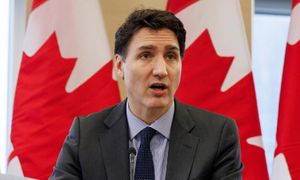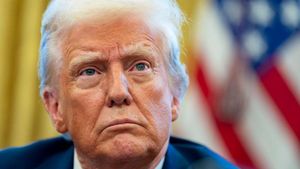The global financial markets are bracing for turbulence as US President Donald Trump’s recent implementation of hefty tariffs on imports from Canada, Mexico, and China sent shockwaves across stock markets, including the German DAX, which is projected to open significantly lower.
Just days before this announcement, the DAX reached a historic high of 21,800 points. Yet, as markets opened on February 3, analysts forecasted it would plummet by 2.5% to around 21,185 points, according to IG Broker reports. This development raises alarms about the potential for increased volatility following Trump's tariffs, which entail 25% duties on imports from Mexico and Canada, as well as additional 10% charges on Chinese goods.
The timing couldn’t be worse for European markets, particularly the German automotive sector, which relies heavily on manufacturing bases located across the Atlantic. "The introduction of the tariffs has shaken not only the stock market but also strengthened the US dollar, putting the euro under pressure," states Deutsche Bank AFX.
Financial analysts warn of the potential repercussions of these tariffs. Paul Ashworth, North America Chief Economist at Capital Economics, cautions, "The inflation spike resulting from these tariffs and other forthcoming measures will be more rapid and severe than we initially expected." This echoes broader concerns about inflation prompting the US Federal Reserve to reconsider its strategies concerning interest rates.
Jamie Dimon, the CEO of JPMorgan, recently shared his apprehensions about the health of the US stock market, asserting, "Asset prices are within the upper 10 to 15 percent of historical valuation." Dimon emphasized the necessity of solid results to justify current prices, underlining the risks the market faces.
The tumultuous conditions lead to predictions of rising prices at the consumer level. The effects of tariffs are expected not just on trade balances but also on expenditure and market sentiment, leaving investors wary. Under such circumstances, any anticipated rate cuts by the Fed within the next 12 to 18 months might become increasingly unlikely.
These geopolitical tensions, compounded by internal market worries, could lead to substantial corrections within indexes like the DAX and potentially the S&P 500, noted market strategist Christoph Geyer.
Dimon reflects broader market discontent, stating, "The inflation question persists. I'm not so sure it will vanish." He highlighted the issues not just with inflation but also with various global struggles, including the challenges posed by geopolitical tensions—whether the conflict in Ukraine or rising tensions within Asia.
Meanwhile, David Solomon, CEO of Goldman Sachs, recognizes the market's overvaluation but points to potential upswings through technological advancements and regulatory rollbacks as possible counterweights.
Market forecasts watchers are particularly alert, knowing full well the unpredictability of upcoming economic indicators. For example, the January US jobs report is expected to reveal the true impact of recent winter storms and how they might skew employment statistics—making predictions increasingly uncertain.
This uncertainty compels investors to reevaluate strategies amid rampant inflation fears and slower growth predictions. With high stakes on the table, the US stock market and its monetary policies face rigorous scrutiny as global economic equilibrium teeters dangerously close.
Given the recent developments, major financial leaders and investors alike are steeling themselves for what lies ahead, creating potential ripples across international markets dependent on US economic activity.
Overall, the ripple effects of Trump's tariffs seem poised to challenge global financial stability as the world watches closely to see how both the US and European markets respond to this tense scenario.



